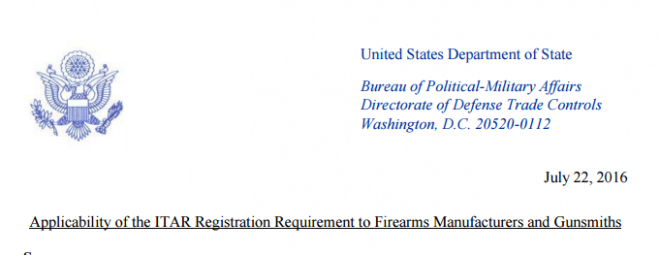While I agree that that Directorate of Defense Trade Controls has gone way above and beyond on the requirement to register for ITAR for those who are threading barrels, the new “clarification” opens an incredibly large “loophole” for the very types of “manufacturers” that the DDTC has been likely to crack down upon.
*It should be noted that I am not a lawyer. However, I am pretty astute at reading contractual and Government language from a long history of selling to the Government. One should always consult a lawyer based on individual circumstances.
Specifically, the new rules and regulations open up AR-15 and common platform assemblers (who actually constitute a large number of the supposed “manufacturers” out there, are basically exempt. Specifically, the DDTC calls out what is not considerred manufacturing.
Registration not Required – Not Manufacturing: In response to questions from persons engaged in the business of gunsmithing, DDTC has found in specific cases that ITAR registration is not required because the following activities do not meet the ordinary, contemporary, common meaning of “manufacturing” that DDTC employs in implementing the ITAR and, therefore, do not constitute “manufacturing” for ITAR purposes: a) Occasional assembly of firearm parts and kits that do not require cutting, drilling, or machining; b) Firearm repairs involving one-for-one drop-in replacement parts that do not require any cutting, drilling, or machining for installation; c) Repairs involving replacement parts that do not improve the accuracy, caliber, or other aspects of firearm operation; d) Hydrographic paint or Cerakote application or bluing treatments for a firearm; e) Attachment of accessories to a completed firearm without drilling, cutting, or machining—such as attaching a scope, sling, or light to existing mounts or hooks, or attaching a flash suppressor, sound suppressor, muzzle brake, or similar item to a prethreaded muzzle; f) Cosmetic additions and alterations (including engraving) that do not improve the accuracy, caliber, or other aspects of firearm operation beyond its original capabilities; g) Machining new dovetails or drilling and tapping new holes for the installation of sights which do not improve the accuracy or operation of the firearm beyond its original capabilities; and h) Manual loading or reloading of ammunition of .50 caliber or smaller.
Activities limited to the domestic sale or resale of firearms, the occasional assembly of firearms without drilling, cutting, or machining, and/or specific gunsmithing activities that do not improve the accuracy, caliber, or operations of the firearm beyond its original capabilities (as described above) are not manufacturing within the context of the ITAR. If you are not manufacturing, exporting, temporarily importing or brokering defense articles or services, you are not required to register with DDTC.
And what is considered “manufacturing”:
Registration Required – Manufacturing:
In response to questions from persons engaged in the business of gunsmithing, DDTC has found in specific cases that ITAR registration is required because the following activities meet the ordinary, contemporary, common meaning of “manufacturing” and, therefore, constitute “manufacturing” for ITAR purposes:
a) Use of any special tooling or equipment upgrading in order to improve the capability of assembled or repaired firearms; b) Modifications to a firearm that change round capacity; c) The production of firearm parts (including, but not limited to, barrels, stocks, cylinders, breech mechanisms, triggers, silencers, or suppressors); d) The systemized production of ammunition, including the automated loading or reloading of ammunition; e) The machining or cutting of firearms, e.g., threading of muzzles or muzzle brake installation requiring machining, that results in an enhanced capability; f) Rechambering firearms through machining, cutting, or drilling; g) Chambering, cutting, or threading barrel blanks; and h) Blueprinting firearms by machining the barrel.
Basically, what the DDTC is telling folks is that if one is not using any special tooling or equipment (ie buying parts and using common tools) that one is not required to register for ITAR. This would apply to those small FFLs that are having receivers manufactured for them under variance or using another companies standard “firearm” (and thus the OEM is responsible for ITAR) and assemble from kits as not being “manufacturers” under the definitions of the DDTC (though they would be “manufacturers” under the eyes of the ATF). This is, of course, predicated on the definition of “occasional” so one would have to do so infrequently.
Further it does clarify that 07 FFLs do not have to register for ITAR if they are not physically performing the “manufacturing” operations per the “ordinary, contemporary, common meaning” that the DDTC is using.
Because the GCA is intended to cover a broader scope of domestic activity than the AECA, the ATF regulations define the term “firearm” more broadly than the ITAR. As a result, not every firearm controlled by the ATF regulations is also controlled by the ITAR.
This does, however, screw the small guy. Small-time gunsmiths are basically now forced to pay ITAR even though they are not “manufacturers” under the eyes of the ATF.
 Your Privacy Choices
Your Privacy Choices
